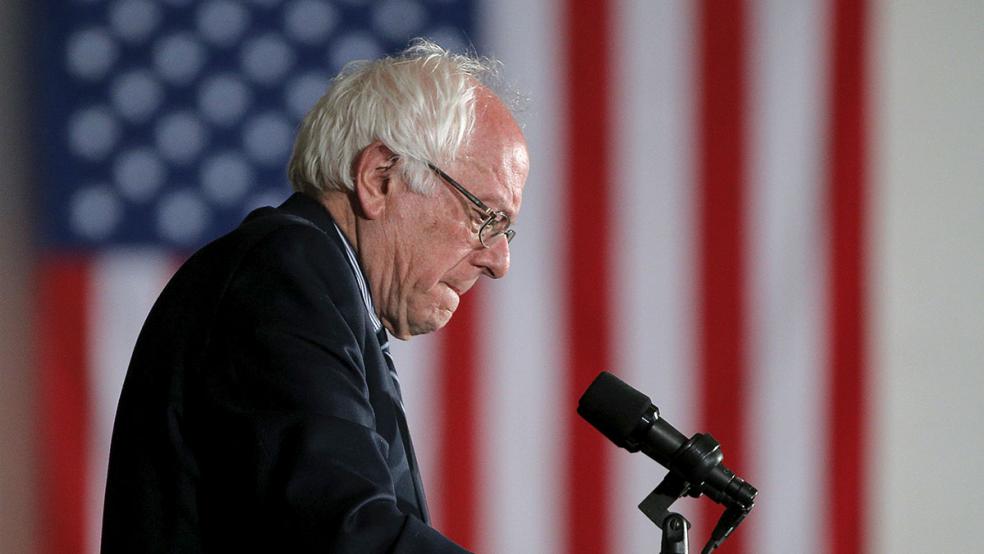Does Sen. Bernie Sanders of Vermont know what he’s talking about when he calls for the breakup of big Wall Street banks, a regular feature of his populist presidential campaign stump speech?
Or, has he really done his homework on the Dodd-Frank law and federal banking regulations--a topic that goes to the heart of his challenge to former of State Hillary Clinton for the Democratic presidential nomination?
Related: Sanders: I’ll Win New York, Too – and Then the White House
The Daily News editorial page published a transcript Monday of its full interview with Sanders April 1 that highlighted vague answers to questions about the Middle East and foreign policy and his game plan for taking on the big banks. At one point in the interview, the editors grilled Sanders on precisely how he would go about breaking up the big banks, and the powers and role of the Treasury Secretary and the Federal Reserve in achieving that goal.
Sanders said that if the Treasury Department concluded a breakup of a mega bank was necessary, then it would be up to the bank’s executives to determine how to unwind the institution within the financial parameters set by the administration to eliminate any risk to the economy.
“How you go about doing it is having legislation passed, or giving the authority to the Secretary of Treasury to determine, under Dodd-Frank, that these banks are a danger to the economy over the problem of too-big-to-fail,” Sanders said, according to the transcript.
Related: 4 Hillary Clinton Flip-Flops That Will Make Voters Think Twice
That sounded fine, until the editors pressed him more on whether he thought the Federal Reserve currently has the power to force a breakup. “Well, I don’t know if the Fed has it,” Sanders replied. “But I think the administration can have it.”
The editorial board forged ahead, demanding to know how JPMorgan, Citibank or Bank of America would be restructured to eliminate the risk of a long-term failure. “I’m not running JP Morgan Chase or Citibank,” Sanders snapped. “No, but you’d be breaking it up,” one of the editors replied.
“That’s right,” Sanders said. “And that is their decision as to what they want to do and how they want to reconfigure themselves.” And so it went.
Members of the news media pounced on the transcript, describing it as “pretty close to a disaster” and a telltale sign that he hadn’t adequately prepared for the interview. And Clinton’s campaign staff gleefully emailed supporters links to the Daily News transcript to back up their argument that the long-time Vermont senator is not prepared to lead the country.
Related: Sanders’ Plan Would Raise Taxes a Staggering $13.6 Trillion over a Decade
Writing in the Atlantic, David Graham said that while no one doubts Sanders’ core liberal convictions, “turning convictions into policy is the challenge, and the Vermont senator’s interview with the editorial board of the New York Daily News raises some questions about his policy chops.”
“It’s striking that there hasn’t been more coverage of Sanders’ policy ideas so far during the campaign, even at this late date, with most of the primary season concluded,” Graham added.
But Sanders’s key advisers and supporters cried foul, insisting that Sanders had adequately and accurately answered all of the questions about breaking up big banks. Tad Devine, a senior campaign adviser, told CNN on Wednesday that the critics are wrong and that “Bernie’s answer on that was absolutely correct…. Everything he said in that interview was absolutely, 100 percent correct.”
Others echoed Devine’s line, including the Huffington Post, which claimed, “In fact, in several instances, it’s the Daily News editors who are bungling the facts in an interview designed to show that Sanders doesn’t understand the fine points of policy.”
Related: Study Challenges Clinton’s Tax Plan for $1 Trillion in New Spending
Mike Konczal, a highly regarded financial expert with the Roosevelt Institute, wrote “The real problem with Sanders’ language” is his promise to begin downsizing banks within a year of taking office. “You’d need to replace a lot of regulators to try this approach, and that takes time, and even then it’s a hard slog,” he wrote.
Konczal insisted, nonetheless, that Sanders did perfectly fine in answering the newspaper editors’ questions and “gave some fairly normal answers on financial reform.”
Yet if Sanders and his advisers were totally comfortable with his performance last week, it wasn’t very apparent. They rushed Tuesday evening to put out the fire with a detailed statement on the senator’s views on banking restructuring.
“Electing Senator Sanders as president would send a clear message to financial regulators that they need to do everything within their power to break up financial institutions so that they can no longer threaten the financial well-being of the American people,” Michael Briggs, Sanders’ spokesperson, said in a statement, according to The Washington Post.
Sanders has pledged to order the Treasury Secretary to create a “too-big-to-fail” list of commercial banks, shadow banks and insurance companies whose demise would pose “a catastrophic risk” to the economy.
Within a year, his administration would work with the Federal Reserve and financial regulators to break up the large banks, utilizing authority of Section 121 of the 2010 Dodd-Frank financial regulatory reform legislation, according to the campaign statement.





